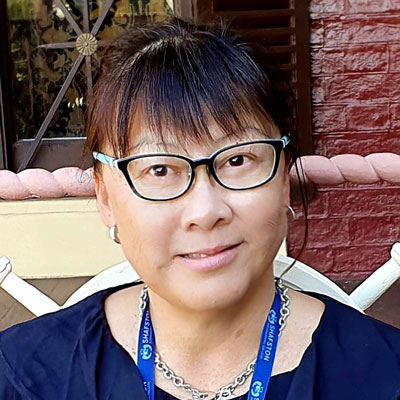- Home
- RTOs
- Focus on compliance
- Series 1 | Trainers and assessors
- ASQA | Spotlight On trainers and assessors, Chapter 5
ASQA | Spotlight On trainers and assessors, Chapter 5
Insights from the sector
Chapter 5 brings you practical insights into engaging trainers and assessors to deliver quality outcomes for students.
We have invited contributors from our Stakeholder Liaison Group (SLG), as representative members of the Australian VET sector, to provide insights about some of the methods they use to manage and continuously improve their trainer and assessor arrangements.
Providers are reminded that it remains your responsibility to ensure adherence to the Standards at all times.
Improving RTO practices
It is recognised that any RTO should use methods that are best suited to their organisation, taking into consideration business size, the industry areas they deliver to and student cohort needs. Below we have some advice, insights and examples from five members of our SLG across the spectrum of RTOs in Australia, outlining ways and methods of improving RTO practices when engaging trainers and assessors to deliver quality outcomes for students.
Sue Watts
RTO Manager and VET Consultant for the Catholic Schools Office Lismore Diocese (Trustees of the Roman Catholic Church Lismore Diocese, RTO 7054), a Catholic Secondary School RTO based in NSW.

Approach to competency and currency
In relation to competency and currency, all new VET teachers (trainers and assessors) are coordinated centrally by the NSW three school sectors. Together with industry representatives and external RTOs, potential staff are assessed against benchmark requirements to enrol into the qualification to be delivered. Trainers and assessors complete an induction and orientation program to ensure a thorough understanding of requirements before commencing the training. The application process requires trainers and assessors to submit copies of their industry qualifications, trainer qualifications and teaching qualifications. Any qualification upgrades are identified and training completed.
Recording professional development
Professional development and industry currency is recorded in our Learning Management System within the Trainers Portfolio. Trainers are encouraged to participate in a range of activities to maintain currency, and their records indicate this has occurred. An annual check is undertaken and reviewed by the school and the RTO.
Knowledge sharing
Trainers and assessors are also involved in Industry Specific Networks, VET Networks and Validation and Moderation sessions to ensure industry and trainer and assessor knowledge is shared and developed and tasks remain compliant. Support and direction is provided by the School VET Coordinators and Diocesan RTO representatives.
Implementing mentoring
We implement mentoring of new trainers and assessors by existing staff with significant experience within their home school including VET Coordinators, Leaders of Pedagogy and Teaching and Learning. Trainers and assessors also share best practice with colleagues through collaborative platforms such as Google Classroom and Google Docs.
Approach to supervision
If supervision is required, a suitably qualified and experienced teacher (trainer/assessor) would be appointed.
School leadership teams are also involved in the process to ensure input is made at the leadership level. This enables systems to be implemented to ensure that a qualified trainer and assessor is put in place if required. School VET Coordinators oversee this process with RTO Representatives providing support and guidance.
Jo Kwai
Compliance, Curriculum and Development Manager of Shafston House College Pty Ltd (RTO 32004), a privately operated RTO based in Queensland.

Getting to know our trainers
When interviewing a prospective trainer, we always ask about the professional development they've undertaken and how they have maintained currency. It enables the organisation to gauge how the trainer maintains their currency, to ensure there is continuous self-development. We can find out if they value these learning opportunities and see this aspect as being an important part of being a trainer and assessor.
Creating opportunities
Small RTOs face the challenge of wanting their trainers and assessors to join some great professional development opportunities but these can be cost prohibitive. To overcome that, these opportunities are added to the professional development calendar to keep trainers informed of external opportunities, and trainers are entitled to two-paid days of professional development activity. We encourage staff to sign up and join mailing lists with organisations that offer professional development, as it is a good way to know what’s on offer.
Staying in touch
Joining peak-body / local industry meetings is also a good way to ‘keep tabs’ on what’s happening within the industry, and what future changes and developments are in the pipeline. These are often the same organisations that host ‘annual professional development' or regular professional development activities for members.
Supporting our staff
To support our staff, we run in-house professional development led by the Training Coordinator. Staff sign-on sheets are circulated prior to the session commencing, and then professional development certificates are generated and issued to attendees.
Ongoing professional development
RTOs via training managers / CEOs / general managers need to have a culture of professional development and continuous improvement in place, including a 12-month professional development calendar. Professional development should be an agenda item at monthly management meetings as well, and we encourage individual trainers and assessors to have ‘external’ catch-ups with others through their own networks.
Margie Fixter
Executive Director, Quality, Teaching and Learning at TAFE SA (RTO 41026), a Technical and Further Education Institute based in South Australia.

The importance of ‘dual professionalism’
Recruitment of educators is generally the role of the individual workgroups and business unit areas; we emphasise the importance of ‘dual professionalism’ - having industry qualifications and currency, plus educational competency and currency.
For our RTO, TAE40116 is the minimum accepted qualification for educators to be employed, including casual educators. In circumstances where we consider employing industry experts that do not have the TAE40116, we have a process in place where they can apply for an exemption but they still need to meet the minimum requirements of the Standards for RTOs.
Competency and currency matrix
We have implemented an educator competency and currency matrix. Educators are required to record their qualifications relevant to what they are teaching, down to the unit level – what qualifications they have that match each unit, and what currency aspects they have for that industry component.
Professional development
We use a Moodle platform and all of our professional development is recorded there. This includes uploading any professional development that trainers and assessors do externally. All of the professional learning that is not formalised – such as communities of practice, secondments, special projects – is also valuable professional development to record.
Staying in touch
During COVID, regular opportunities to listen and raise concerns have sprung up organically. We operate across a number of projects and initiatives; first, this is run by the directorate then we engage in a bottom-up approach, and also engage with influencers across the organisation who are making a difference, one conversation at a time. This takes facilitation, showcasing and listening.
Reverend Dr Andrew Cameron
Director of St Mark’s National Theological Centre (Anglican Church Property Trust Diocese of Canberra and Goulburn, RTO 88072), a privately operated RTO based in the ACT.

Our trainer and assessor matrixes
In relation to competency and currency for trainers and assessors, we maintain trainer and assessor matrixes and hold both soft and hard copies of our trainer industry and TAE competencies. These records are reviewed on a regular basis as required. All of our trainers and assessors are expected to maintain competency, and to encourage this we help cover the cost of TAE completion for prospective trainers with industry expertise, and of upgrades for existing trainers. Our trainers maintain currency by continuing to work in their areas of expertise and through membership of relevant professional associations.
Regular professional development plans
Trainers complete a professional development plan on an annual basis and maintain industry currency through membership of relevant professional bodies. Membership with peak bodies and engagement with VET professional development organisations provides scope for identifying professional development opportunities in training and assessment.
Learning management systems
Our lead trainers support other trainers and assessors and share knowledge through our learning management system, Moodle. Zoom video-conferencing is used to facilitate information sharing. We use the Chalkport QMS for the VET Quality Framework, and are building an intranet site for all our employees.
Our lead trainers provide supervision for less experienced trainers and assessors. Lead trainers include members of the Australasian Association of Supervision (AAOS) and supervisory institutes within our industry. Our RTO is looking to further ensure quality assurance, through continuing development of processes for systematic monitoring and evaluation.
Christine Robertson
Executive General Manager of Open Colleges Pty Ltd (RTO 90796), a privately operated RTO based in NSW that delivers online learning to students across Australia.

The importance of professional development
In the context of competency and currency, we implement various practices, including ensuring trainers and assessors schedule return to industry participation and professional development into their quarterly performance development and review plans. We also include a quarterly review of trainer records, capturing specific tasks completed in the workplace to ensure competency and currency as well as supporting staff to attend industry events and webinars and to undertake higher qualifications in their expertise area.
Project based learning opportunities
In addition, we use shadowing, mentoring and project based learning opportunities within our RTO and maintain industry partnerships with organisations that provide professional development opportunities to staff in the form of newsletters, webinars, roadshows, conference and radio channels. We also maintain corporate memberships with industry associations providing professional development opportunities through access to extensive libraries of supporting resources and webinars for trainers and assessors.
Peer training
In relation to encouraging support between trainers and assessors for shared knowledge, our practices include provision of internal peer training sessions between trainers and assessors on topics of strength – for example, assessment design, design and delivery of compliance-based training by internal compliance champions, encouraging and supporting trainers and assessors to share learning and development resources and store them digitally in document management systems like SharePoint. We use regular weekly team meetings and digital communication channels/digital notice boards, to encourage staff to share professional development opportunities.
Managing trainer and assessor supervision
On the topic of managing supervision of trainers and assessors, we implement practices including managers scheduling and undertaking regular reviews and internal audits of training delivery and assessment outcomes where/as appropriate; and wherever possible, employing staff with the required skills and experience.
More Spotlight On
Share

View the webinar recording on trainers and assessors
ASQA held a webinar on 4 April 2021 to wrap up our first Spotlight On series about trainers and assessors.
The presenters include ASQA Stakeholder Liaison Group members, TAFE Queensland and ASQA Director, Education and Guidance, Emma Marks.

